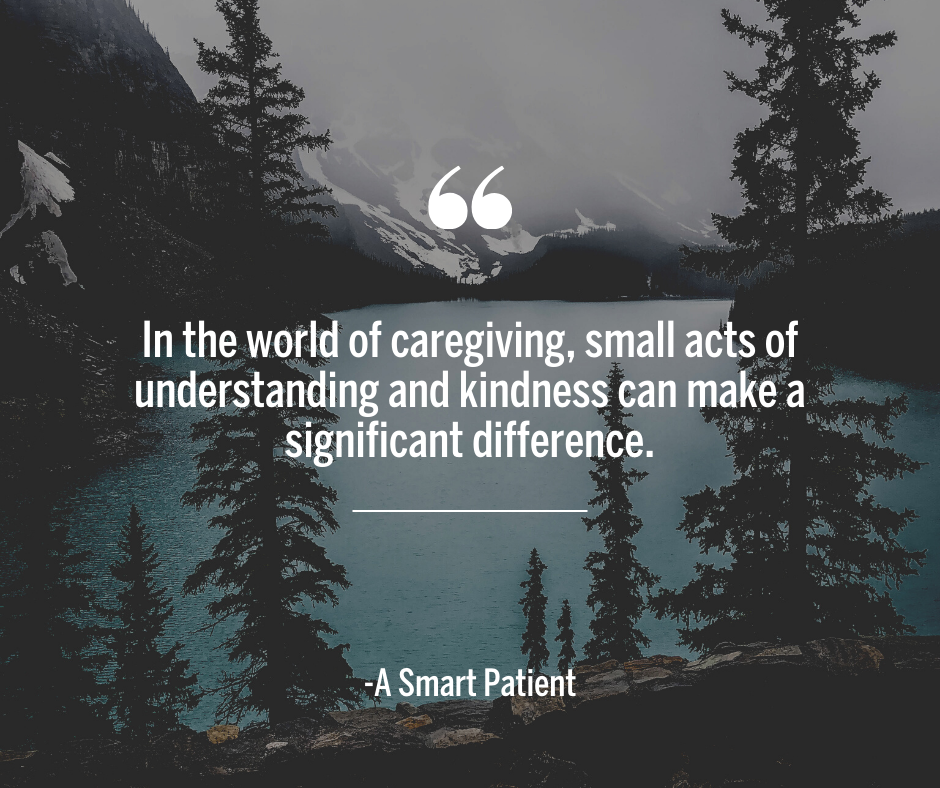Stay Strong and Lighthearted
Recently, members of our caregiving community started a conversation about the steep learning curve for people who are suddenly taking care of a sick family member. One member shared what he has learned over the last 10 years while caring for his father with Huntington’s Disease.
He wanted to share this thoughts on our blog to help even more people new to caregiving learn from his experiences.
Here are his top 10 tips for people new to caregiving:
When you want to ask a question, get their attention first.
With my dad, if the TV was on, he would never hear you. He could only focus on either the TV or you. I would have make sure he knew who I was, turn the TV off and then use nonverbal cues and touch to help keep him focused.State your message clearly.
Use simple words and sentences. Speak slowly, distinctly, and in a reassuring tone, pitch your voice lower. If my dad didn’t understand the first time I would repeat the question exactly the same way. If he still doesn’t understand, I would wait a few minutes and rephrase the question. This gave us both time to calm down feelings and think.Ask one question at a time – yes or no answers work best.
I learned that the harder I tried the more frustrated my dad got. Early on I would ask him a bunch of questions trying to figure out what he needed. I thought I was helping but I wasn’t. The questions made him more frustrated and confused. Later I figured out that if I ask him just one or two questions and give him time to think it helped more.Listen with your ears, eyes, and heart and be patient in waiting for the reply.
If my dad was struggling for an answer I would suggest a few words and watch for nonverbal cues and body language. I would always strive to listen for the meaning and feelings that underlie the words.Break down activities into a series of steps.
This makes many tasks much more manageable. I encouraged my dad to do what he could, sometimes I would have to remind him of a step in the process here or there but would let him do it. Some steps he could no longer do on his own and those were the ones I would assist with.When the going gets tough, redirect.
Dad loved Wendy’s chili and frostys. When he became upset or agitated having Wendy’s a block away was a lifesaver. If he got upset in the morning I would say to him, “Looks like you’re having a bad day. Do you want to go to Wendy’s for lunch?” The answer was always yes. He would calm down in the morning anticipating going to Wendy’s and after lunch, life was better for him. You don’t have to do something that cost money, just do something they love.Respond with affection and reassurance.
My dad would often get reality confused and would recall things that never really occurred or came from a TV show he watched a week earlier. I learned that you can not convince them that they are wrong and will only hurt them if you try. You have to focus on the feelings they are demonstrating (which are very real) and respond to them.Remember the good old days.
Dad would lose track of time, not know what day of the week it was or even forget what happened 45 minutes ago. However, when we would look through photo albums or friends and family would come over and talk about the past he was as sharp as a tack. I learned I had to be his short-term memory and only ask him general questions about his distant past, that was the information he retained in his brain.Maintain your sense of humor.
When Dad started forgetting what day of the week it was or even what month at first I would correct him. However, when I started taking it with a grain of salt and would joke about how I can hardly remember what day it was it helped him to maintain his dignity. Humor can also help you as a caregiver to deal with the stress that mounts as a result of caring for someone. My Dad could easily pick up on my feelings and emotions and when they were stressful or negative he would become agitated and frustrated. When humor was introduced my mood became lightened and so did his.Stay strong and lighthearted.
I have seen every episode of The Andy Griffith Show at least twice – maybe three times. Not because I like the show but because my dad had to watch it every day just to smile. Once my dad and I found the balance between good mood and greater care, our relationship was strengthened.
These 10 tips for new caregivers remind us of the depth and complexity of caregiving. These tips, ranging from effective communication to maintaining a sense of humor, underscore the importance of patience, empathy, and resilience in caregiving. They offer practical advice and emotional support, helping new caregivers navigate the challenging yet rewarding path of caring for a loved one. While caregiving can be demanding, it's also filled with moments of joy, love, and profound connection. Let’s carry these lessons forward, remembering that in the world of caregiving, small acts of understanding and kindness can make a significant difference.

